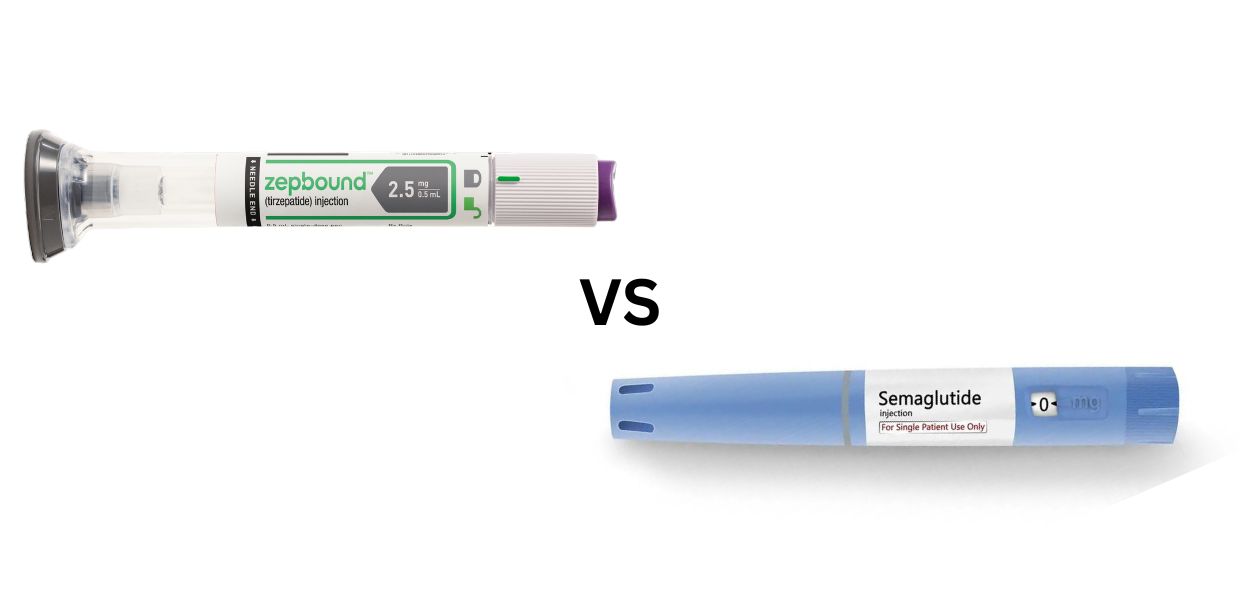Semaglutide and Zepbound (tirzepatide) are both used in the treatment of type 2 diabetes and for weight management, but they have distinct characteristics and mechanisms of action. In this article we will go over the similarities and differences to help you decide which GLP-1 agonist is right for you!

How They’re Similar
Both semaglutide and Zepbound (tirzepatide) act as incretin mimetics, which means they mimic the action of hormones that are naturally involved in regulating blood sugar levels and appetite control.
These medications work to enhance insulin secretion when blood sugar levels are high, which helps to manage diabetes effectively.
Additionally, they both suppress appetite and food intake, contributing to weight loss. This suppression is achieved through mechanisms like delaying gastric emptying, which extends the feeling of fullness after eating and reduces overall calorie intake.
Both drugs are approved for the treatment of type 2 diabetes and have applications in weight management, underlining their role in helping patients achieve better control over their blood sugar levels and body weight.
How They’re Different
The primary difference between semaglutide and Zepbound lies in their mechanisms of action. While semaglutide is a GLP-1 receptor agonist that solely targets the GLP-1 receptor, Zepbound combines GLP-1 receptor agonism with GIP receptor agonism.
This dual action means Zepbound targets two distinct pathways for blood sugar control and weight management, potentially offering a broader spectrum of benefits. Zepbound’s unique approach of also activating the GIP receptor may provide an advantage in enhancing insulin release and reducing liver glucose production, in addition to affecting appetite and food intake.
Clinical trials have suggested that Zepbound can lead to significant weight loss and blood sugar control, indicating it may offer additional benefits over GLP-1 receptor agonists like semaglutide. This dual incretin action makes Zepbound a distinctive option in the treatment landscape for diabetes and obesity, highlighting its potential to deliver improved outcomes for patients.

Which Is More Effective For Weight Loss, Zepbound or Semaglutide?
When evaluating the effectiveness of Zepbound (tirzepatide) and semaglutide for weight loss, it’s essential to rely on clinical trial data to guide comparisons. Semaglutide, particularly in its weight loss formulation known as Wegovy, has demonstrated significant efficacy in reducing body weight. In the STEP 1 clinical trial, participants experienced an average weight loss of approximately 15-18% of their starting body weight over a period of 68 weeks, using the highest weekly dose of 2.4 mg. This outcome is attributed to semaglutide’s mechanism of action, which involves mimicking the GLP-1 hormone to increase insulin release, suppress appetite, and thereby reduce food intake.
On the other hand, Zepbound (tirzepatide) has shown promising results that potentially surpass those of semaglutide in terms of weight loss. The SURMOUNT-1 trial highlighted that participants receiving tirzepatide could achieve an average weight loss of around 20% of their body weight over 72 weeks. This superior performance is likely due to Zepbound’s dual action mechanism, targeting both the GLP-1 and GIP receptors, which not only improves blood glucose control but also facilitates a greater reduction in body weight.
Between the two, while both medications offer substantial weight loss benefits, tirzepatide appears to have a slight edge in the percentage of weight loss observed in clinical studies.

Which Has More Side Effects?
Comparing the side effects of Zepbound (tirzepatide) and semaglutide based on clinical data reveals that both medications exhibit a range of side effects, predominantly gastrointestinal in nature.
For Zepbound, common adverse effects include gastrointestinal issues like nausea, diarrhea, decreased appetite, vomiting, constipation, dyspepsia, and abdominal pain. Additionally, Zepbound has been associated with an increase in heart rate, with sinus tachycardia reported in up to 23% of patients. Serious but less common effects may involve difficulty breathing, fast heartbeat, and swelling of the face, throat, or tongue.
Semaglutide’s side effect profile also heavily features gastrointestinal disturbances. Nausea, diarrhea, vomiting, constipation, and abdominal pain are very common, affecting a significant portion of users. Specifically, nausea can affect up to 44% of users, diarrhea up to 30%, and vomiting up to 24%. Beyond the gastrointestinal effects, semaglutide may cause an increase in heart rate similar to Zepbound, and in rare cases, it has been associated with anaphylactic reactions. Additionally, semaglutide might increase the risk of medullary thyroid cancer, a concern shared with other GLP-1 receptor agonists.
Both medications can cause a range of other effects, such as changes in appetite, indigestion, and increased risk of hypoglycemia, especially when used in combination with other diabetes medications. Semaglutide, in particular, has been noted for potentially causing diabetic retinopathy complications in patients with type 2 diabetes and a history of diabetic retinopathy.
While the side effect profiles of Zepbound and semaglutide are similar, the choice between them should consider individual patient factors, including the potential for side effects, other health conditions, and how the medication fits into their overall treatment plan.
Takeaway
Both medications work by mimicking the body’s natural hormones to regulate blood sugar levels and suppress appetite, contributing to weight loss. While Zepbound, with its dual incretin action (GLP-1 and GIP receptor agonism), has shown slightly higher weight loss percentages in clinical trials compared to semaglutide, both have substantial side effects, primarily gastrointestinal in nature.
The choice between Zepbound and semaglutide isn’t straightforward and depends on individual health profiles, the presence of comorbidities, and personal response to medication. Talk to us at Weight Wise to find out which compound is right for you!



